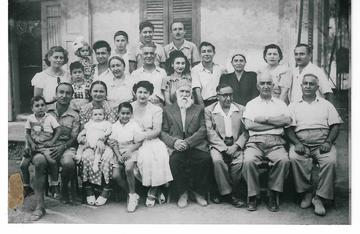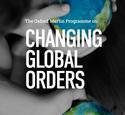Displacement and Belonging: Rethinking World Order through Family Histories

In the summer of 1875, in an orchard in the city of Samarkand, a large crowd of relatives and friends gathered to bid goodbye to the Asheroff family. Abraham Asheroff, originally surnamed Asher before it was Russianized to appease the new rulers who occupied his region a decade earlier, wanted to keep a vow he had made for his son’s recovery from an injury by traveling to Jerusalem to give thanks. He was a textile merchant used to travel, but this was the first time his wife and children accompanied him.
The family’s journey lasted months, during which they passed through Tashkent, where their fourth son was born. They spent time in Orenburg, trying to prove their Russian subject-hood to be allowed to travel within the Russian Empire. They took the new railway to Moscow and Odessa, where they embarked upon a Lloyds Triestino sailboat to Istanbul and then Jaffa. When they reached Jerusalem, Abraham married off his eldest son Zion and sent him to do business in Istanbul. By sixteen, Zion mastered Arabic, Hebrew, Tajik, Russian, French, and Ladino. He felt equally at home in Central Asia and the Middle East, travelling alone or with his wife. He sent his profits to his father, who used them to build a majestic house outside Jerusalem’s city walls.
The Asheroff’s history of displacement is closely tied with global order and disorder. During the Russo-Japanese War (1904-1905), Zion left his family in Jerusalem to save his business in Central Asia. When the war prevented him from sending funds to his wife, she decided to take the children and return to Samarkand on her own. When the First World War broke out, the Asheroffs who remained in Jerusalem were declared Russian enemy subjects in Ottoman territory; they were given the option of either joining the Ottoman army or leaving. Many returned to Samarkand, only to be imprisoned a few years later by the Bolshevik rulers as bourgeois enemies of the people. Moving across borders was a normal state of affairs for the Asheroffs, at least until the Soviet Union closed off the borders of Central Asia in the late 1920s, forcing them to leave permanently. Then, they obtained Afghan passports, which allowed them to live in mandatory Palestine while continuing to travel along major trade routes in the Balkans and Eastern Europe.
In my book, Air and Love: A Story of Food, Family and Belonging, I examine the history of displacement of three families, including the Asheroffs, between the 1860s to the 1960s. I share the stories, and recipes, of people who lived ‘on the road’ for generations until the rise of nationalism forced them to settle down. The book’s exploration of displacement invites a reflection on the ‘family’ as a protagonist of international relations. The Asheroffs were a transnational family; however, I would argue that until the early twentieth century, they are more accurately described as ‘trans-imperial,’ as they lived between the Russian and Ottoman empires. The family’s members grounded their sense of identity not in any particular polity, nor in an individualistic cosmopolitanism, but rather in familial bonds of kinship. The book traces the movements of the men and women of the Asheroffs and explore how their displacement generated complex senses of cultural and political belonging. Through their mobility, they created a new map of political spaces, overlapping with parts of the Ottoman, British and Russian empires, and later several nation-states, all held together by familial bonds.
Transnational Families and International Relations
This micro-history of a family’s multi-generational displacement may help us, as Carlo Ginzburg suggested, raise new, larger questions, and specifically about how we think about international relations. As Lamia Tayeb has shown in her study of transnational families, their particular and idiosyncratic histories help challenge conventional notions of personal belonging, political space and collective identity. In this case, and especially if we take a page from critical theorist Sandro Mezzadra and emphasise the agency of migrants in the process of displacement, we should consider the ‘family’ not as a passive object or a general social category but as a protagonist of international relations (IR).
Recent IR scholarship has shown the relevance of kinship as an anthropological category to the study of world politics. Kinship and familial bonds have been studied in postcolonial and transnational contexts, or as a metaphor in international politics and law. Yet the definitions of both kinship and family are sometimes vague. Kinship is a term invoked to reflect on deep connections and allegiances, tied to the notion of the family, but also extended to further circles of support and friendship. It entails socially confirmed relations. In my book, I use the term ‘family’ to denote not only blood relations but also relations acquired by marriage and close or meaningful friendships.
Is the space of familial bonds distinctly political or a-political? In the history of political thought, the family has often been depicted as the rival of the state, or an antecedent form of social order. What might be the political meaning of kinship if we consider this term in relation to non-elitist family-based groups? Is the transnational family, and the political spaces it creates, a relic of pre-modern times, a conservative structure, or a modern political form that seeks to defy inter-imperial and international structures?
Peter Haldén suggests that, rather than separating kinship from statehood, kinship embodies alternative ways to conceptualise modern political order. But he is preoccupied mostly with hereditary elite families, not with the family as a political subject as such, nor with its presence in the international realm. The anthropologist David Sneath has shown that the political order based on familial bonds, which is characteristic of nomadic societies in Central Asia (perhaps also reflecting the Asheroffs’ early history), has similar aristocratic and hierarchical elements as states.
Yet in British imperial thought, ideas of kinship, often peppered with racial prejudices, have been used to envisage political bonds of domination across vast territories and to justify the preservation of oppressive imperial political structures. Nonetheless, I want to investigate if familial practices can help us extrapolate the family as a political unit, moving it out of imperial conservative and hierarchical frameworks, and endow it with emancipatory power, as a tool of resistance against political oppression and domination on global scale. I do not suggest that we should celebrate or reify the family, but rather try to think beyond singular frames to explore, in detail and within context, its multiple emancipatory and oppressive aspects. The family is not a sphere of equality and democracy, as Halden has shown, but it can generate a modern structure of alternative political allegiances capable of making substantial claims from its members and operating as an ordering agent in a global context.
The Role of Food in Shaping International Order
For over five decades, the Asheroff family travelled back and forth between Samarkand and Jerusalem, straddling the Russian and Ottoman empires. The family history of mobility is documented in three memoirs written by Zion and his two sons, which also shed a light on the family’s affective and economic networks, often practiced around culinary rituals. Meals became the temporal framework and material form in which familial bonds were reinforced, acknowledged and maintained in movement. In the memoirs, food is mentioned multiple times as an important aspect of family life, but also a dynamic one, where recipes evolved and changed through mobility, with no nostalgic yearning for authenticity.
If we take food as a proxy of cultural identity, the Asheroff family embraced a complex, changing and inclusive sense of taste and belonging. Their recipes, which could not be pinned down to one place or one time, went against the logic of modern politics and its claims of allegiance.
The challenge posed by familial bonds to national identities sometimes translated into alternative political orders. For example, during the First World War and the Bolshevik Revolution, the men and women of the Asheroff family embraced cooking as a mode of resistance against state-centric domination and violence. Kinship-based food banks and communal kitchens emerged to provide subsistence when the state failed or refused to do so. Whereas these non-elitist families did not hold significant political power to challenge the state- or empire-based global order, they could carve out a political space of co-habitation – often extending across continents through practices of mobility – where eating and cooking became a token of both security and belonging.
The Asheroff family saw themselves as members of a transnational familial community, rather than as citizens or subjects of a particular state or empire. Their cosmopolitan familial identity generated a transnational space of contestation of state-centric politics, a space of affection and care – and occasionally tensions and jealousy too, that undermined formal political belonging. In the Asheroff’s family, kinship was transformed by mobility and preserved through dynamic culinary practices. Family was no longer a model of sedentary belonging. Their movements created new spaces of connectivity, new geo-mental maps of memories, that transcended national or imperial borders.
Undoubtedly, the Asheroffs remained small players in world politics: they were not part of a political elite, nor did they impose their visions of order on a wider community. However, their stories can be inserted into larger narratives in the history of global orders. Their mobility and their family-based sense of belonging offer a new means to respond to, and perhaps to resist, the impositions of imperial regimes and national ideologies alike, through practices of alternative ordering or by fostering trans-national familial cultural and political identities.
In my book, I argue that micro-histories of mobility can generate useful insights into possible models of co-habitation as a supranational ethical-political goal, countering the forces of suffering, subjugation, and oppression in existing political orders. By considering the family unit as an agent in international relations, we can intentionally deviate from state-centric politics and emphasise the ways in which transnational migrant familial networks have challenged state violence, nationalism, and exclusion.

|
|
Dr. Or Rosenboim is an Associate Professor of Contemporary History at the University of Bologna. Her work explores the history of international thought in the twentieth century, focusing on ideas of world order in the United States and Europe. She is also interested in the history and politics of migration and food, and founded The Migrants’ Supper Club in London. Her new book, Air and Love: A Story of Food, Family and Belonging, is now out with Picador UK. |




